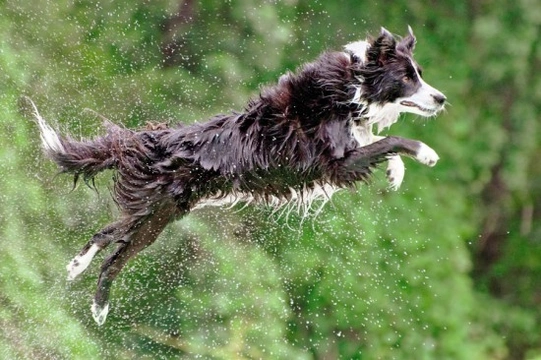
Dogs and Water......Have fun, stay safe
As the summer days loom, it is natural that many dogs like to play and cool down in water - with or without their owners! At the first sight of a sunny day, many of us are tempted to hot foot it to the nearest beach or river for a refreshing dip.
Swimming is a great way for your dog to stay fit and active as it is low impact on the joints and is a good, all round aerobic exercise. Many dogs love the water and in the cases of some breeds such as Spaniels, Retrievers and Newfoundlands, keeping them out of the water is the problem. Indeed, many of these dogs are adapted for swimming, having webbed feet, a double coat and thick rudder like tails but not all dogs are natural swimmers. Some dogs are simply not the right shape or size for swimming with dogs such as the Corgi, Bulldogs and Greyhounds just not being cut out for a life in water. Whatever your breed, the responsible owner must be mindful of possible dangers that may be present when having fun in the water.
If introduced to water as a pup in a careful and considered manner many dogs will gain in confidence quickly. Initial water adventures should be conducted in a mellow pool or river with no strong currents. Do not force your dog to enter the water as this could lead to anxieties later in adult life. Cox him in with toys, treats or another water loving dog who can help him catch onto the idea. If you notice he looks tired do not force him to play and instead give him lots of praise and carry on with your walk.
Different bodies of water have different perils. A trip to the seas side or the river is fun for all concerned, but a few things to be mindful of, for your own safety as well as your dogs, include:
- Strong tides, rip tides
- Strong currents
- Waterfalls and weirs
- The weather conditions such as strong winds
- Jellyfish and other stinging fish, if prolific in the area
- Submerged rocks and sharp rocks and reefs which could cut your dogs paws
In addition, if you decided to take a trip on a boat with your dog, special 'doggie live vests' are available. They help provide extra buoyancy and are usually equipped with a 'grab handle' in case your four legged friend takes an overboard tumble. They are also useful while swimming with your dog, as they can help expend less energy and keep Fido warmer, meaning they can stay in the water longer for more fun and action!
In addition, make sure you observe your dog's body language, taking note of when he is tired and removing him from the water before he becomes exhausted. Hypothermia may also become a problem, even when it is warm. Watch out for signs of excessive shivering, shallow breathing and blue or pale gums.
Lastly, give your dog a rinse when he gets out of the water! A quick squirt with fresh water is needed to remove any salt, algae or chemicals thus minimising the risk of any skin irritation.
As a caring owner, your dogs safety will be the first thing in your mind, but also make sure your concerns are for that of yourself and the people around you. If you dog gets into trouble your first instinct would probably be to leap in and help, but think twice before doing this. Many dogs do get themselves out of trouble, leaving their owner floundering. At the beach, call on the assistance of the lifeguard or coastguard who will be able to advise you, and in the case of other bodies of water, do not put yourself in any danger.
Remember, a few minutes forwards planning can be all it takes. If you take the necessary precautions, then your fun day out will remain just that - a fun day.



